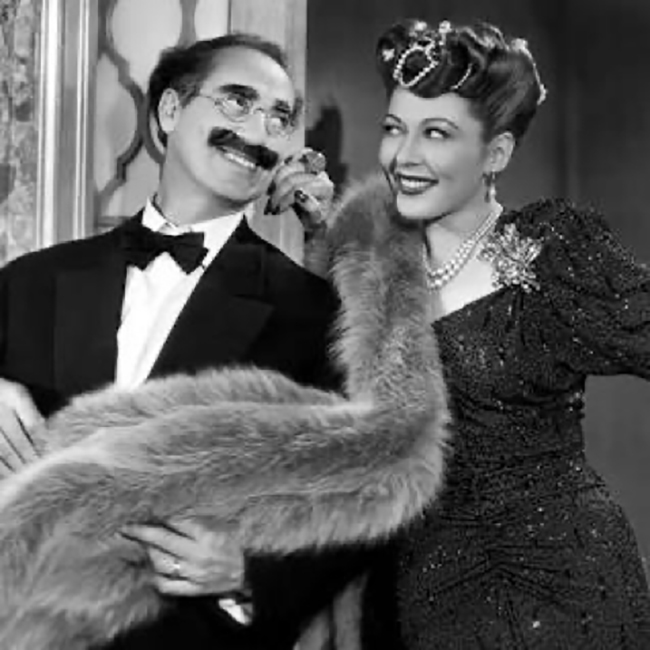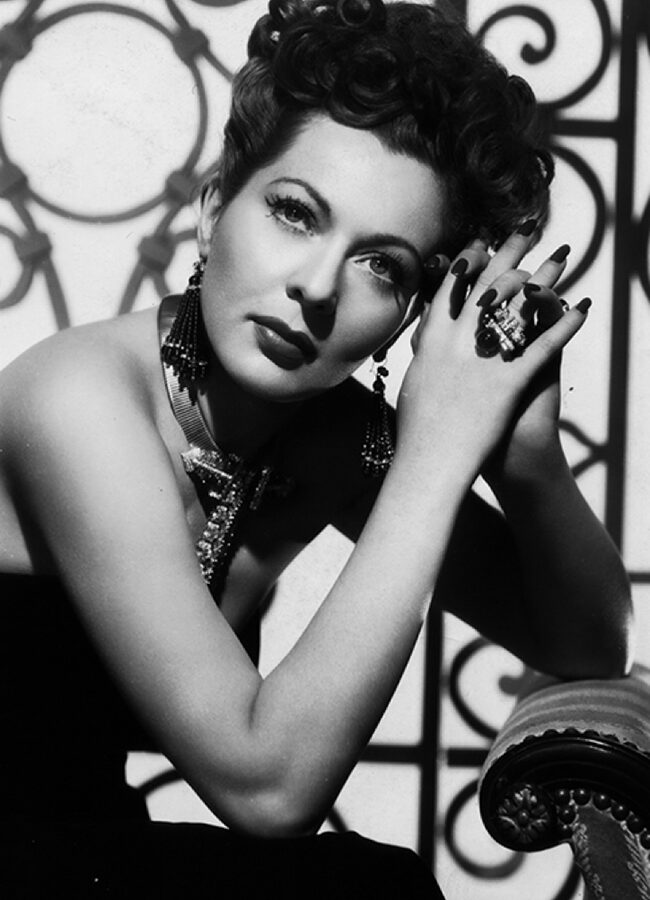Actress, Romanian refugee, and designer who entertained American troops through the USO. Funds support scholarships for young people.
Lisette Verea Ruegg Hunter (1914-2003)
Lisette Verea Ruegg Hunter was an easy laugher. She laughed at jokes on her, and she laughed at jokes on others. She laughed when she had good luck and bad luck, and she felt that having a sense of humor helped her get out of difficult situations.
The internationally known actress, singer, and fashion designer was born in Bucharest, Romania, on August 27, 1914. She was one of four children of Hainerik Chaim Veksler Verea, a portrait painter, and the former Olga Veksler. At 16, she appeared in a benefit play for the Red Cross and was spotted by the most important producer in Bucharest. The next day he approached her at a swimming pool where she was sitting with her friends and said he wanted to back a play with her as the star—a play that had not yet been written.
After it opened, she became an overnight sensation. By 18 she had her own theater. A film producer saw a performance and asked her to star in the first Romanian film ever made, Trenul Fantoma (1933). Her co-star was Tony Bulandra, or “the Romanian John Barrymore.” Lisette became known as the “Toast of Bucharest” and “Darling of all Romania” and toured Egypt, where she was decorated by King Farouk. She had many suitors and broke off two engagements.
She was inspired to live in the United States after she acted in imported American plays, such as Ben Hecht and Charles Macarthur’s The Front Page. Her movie contracts would not allow her to leave the country—and then the Nazis invaded Romania. It took four months for her to get out. Her journey took her through Sofia, Istanbul, Baghdad, Karachi, Bombay, and Cape Town. She arrived in New York on the S.S. President Grant in the fall of 1941.
During World War II, she entertained with the USO in New York and was deeply supportive of American servicemen. Her first New York role was in the play High Kickers. In 1944, she appeared on Broadway in the double-bill operettas La Serva Patrona and The Secret of Suzanne, and a revival of The Merry Widow.
Dissatisfied with her costume for The Merry Widow, which was so tight she had trouble breathing, one night she looked over at her gown, slit the skirt up one side and made other alterations. “The management,” she told a reporter, “liked it so much they enlarged my speaking part.” It did not hurt that the dress revealed what one newspaper referred to as “gorgeously contoured gams.”
After the performances, she would sing at Le Ruban Bleu nightclub on East 56th Street, wearing dresses and hats of her own design. In late 1945, she debuted “Lisette Verea Originals,” a series of silk prints made from Brazilian yarn, which were bought by major couturiers. Her prints were zany and playful – one was scrawled with the words “yes-yes-yes,” and another featured a boy and a girl talking on either end of telephone wire.

Today she is best known for her role in the Marx Brothers film A Night in Casablanca (1946), in which she sang “Who’s Sorry Now?” in French and English, playing a moll with dubious intentions. Few knew she designed her own costumes.
There were practical jokes on set: One night she got into a trunk as part of the script and crew members “forgot” to take her out. She gasped, and laughed, and was rescued. Groucho Marx told her, “You’re a good sport and not as dumb as I told people you were.”
After the film, many studios wanted to cast her, but her heart was in fashion design. She returned to New York to pursue that career. In 1946, she married textile manufacturer Erhart Ruegg. Erhart died in 1950.
In 1954, Lisette married tennis player Francis Hunter, an Olympic gold medalist, later saying she had “hit the juke-box” when she met him. Francis was the publisher of 14 Westchester newspapers; Yankee Stadium Club president; a major tennis promoter; and owner of 21 Brands, a liquor importer and distributor. He died in 1981.
Lisette had strong opinions about American men. While she was still single, she gave an interview in which she declared that American men did not work hard enough to woo women. She suggested a three-point improvement plan for the men: “1. Take a nap after lunch, in order to be less tired in the evening. 2. Don’t drink during the day, and take only one cocktail before dinner. 3. Don’t talk shop out of business hours.”
She concluded, “Americans are always thinking about business. In the evenings they should think only of love.”
She died on her 89th birthday, August 27, 2003.
Her fund at The Trust assists “young Americans of promise…to pursue their educational goals.”
